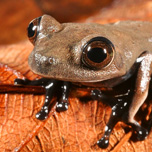November 15, 2013 — All the corners of the globe have been explored, right? Think again. An international team of field biologists studying the mountainous region of southeastern Suriname — a wilderness area virtually without human influence and among the most remote and unexplored tracts of rainforest left on Earth — recently discovered 60 species, including reptiles, amphibians and insects that are likely new to science and may exist nowhere else on Earth. The team of researchers, led by Conservation International’s Rapid Assessment Program, also documented the vast array of ecosystem services in the region, including providing clean water for downstream uses such as food production, transportation and sanitation.
Suriname is located in the Guiana Shield, a vast wilderness expanse in South America that contains more than 25 percent of the world’s rainforest. According to expedition leader Leeanne Alonso, a former Conservation International scientist who is now with Global Wildlife Conservation, “southern Suriname is one of the last places on Earth where there is a large expanse of pristine tropical forest. The high number of new species discovered is evidence of the amazing biodiversity of these forests that we have only just begun to uncover.”
(The photo above shows a sleek, chocolate-colored “cocoa” frog (Hypsiboas sp.) that may be new to science. This species is arboreal, using circular discs on their fingers and toes to adeptly climb into the treetops. Image courtesy of Conservation International)
Ensia shares solutions-focused stories free of charge through our online magazine and partner media. That means audiences around the world have ready access to stories that can — and do — help them shape a better future. If you value our work, please show your support today.
Yes, I'll support Ensia!
